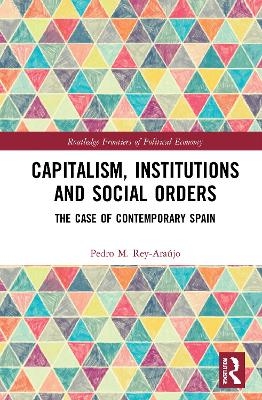
Capitalism, Institutions and Social Orders
The Case of Contemporary Spain
Seiten
2020
Routledge (Verlag)
978-0-367-48066-0 (ISBN)
Routledge (Verlag)
978-0-367-48066-0 (ISBN)
This book develops a novel political economy approach by establishing a dialogue between the Social Structures of Accumulation theory and Ernesto Laclau’s post-Marxism theory. Using this synthesis, it provides an in-depth analysis of Spain’s recent socio-economic evolution since the early-1990s.
Capitalism, Institutions and Social Orders develops a novel political economy approach by establishing a dialogue between the Social Structures of Accumulation (SSA) theory and Ernesto Laclau’s post-Marxism theory. Using this synthesis, it provides an in-depth analysis of Spain’s recent socio-economic evolution since the early 1990s.
The book develops a theoretical framework capable of appraising capitalist dynamics together with their relationship to the institutional environment surrounding and structuring them. This is in order to explore the interrelation between the historical development of the capitalist mode of production, on the one hand, and the various co-existing social processes, social consensuses and political identities, on the other. Contemporary Spain provides an interesting case study: until the onset of the Great Recession, Spain had an impressive macroeconomic record supported by several contradictory social processes, such as a massive real estate bubble, an upsurge in private indebtedness and a deteriorating manufacturing sector. However, the accumulation of internal imbalances during those years led inevitably to the sudden disintegration of this institutional and social environment in the years after 2008, thus resulting into a breakdown of capitalist activity accompanied by widespread social contestation. The book also explores the ensuing political scenario, including the emergence of the ‘indignados’ movement and the anti-austerity party Podemos.
This work is of significant interest to critical political economy and discourse-theory scholars, critical theorists in general, and social scientists concerned with the recent Spanish experience.
Capitalism, Institutions and Social Orders develops a novel political economy approach by establishing a dialogue between the Social Structures of Accumulation (SSA) theory and Ernesto Laclau’s post-Marxism theory. Using this synthesis, it provides an in-depth analysis of Spain’s recent socio-economic evolution since the early 1990s.
The book develops a theoretical framework capable of appraising capitalist dynamics together with their relationship to the institutional environment surrounding and structuring them. This is in order to explore the interrelation between the historical development of the capitalist mode of production, on the one hand, and the various co-existing social processes, social consensuses and political identities, on the other. Contemporary Spain provides an interesting case study: until the onset of the Great Recession, Spain had an impressive macroeconomic record supported by several contradictory social processes, such as a massive real estate bubble, an upsurge in private indebtedness and a deteriorating manufacturing sector. However, the accumulation of internal imbalances during those years led inevitably to the sudden disintegration of this institutional and social environment in the years after 2008, thus resulting into a breakdown of capitalist activity accompanied by widespread social contestation. The book also explores the ensuing political scenario, including the emergence of the ‘indignados’ movement and the anti-austerity party Podemos.
This work is of significant interest to critical political economy and discourse-theory scholars, critical theorists in general, and social scientists concerned with the recent Spanish experience.
Pedro M. Rey-Araújo is a Researcher at the University of Santiago de Compostela, Spain.
Part I. Capitalism, Institutions and Social Orders. 1. Dancing over the ‘middle ground’: Social heterogeneity and capitalism. 2. Setting the terrain: Radical Political Economy and post-Marxism. 3. Ernesto Laclau’s post-Marxism: Some internal problems. 4. Social Structures of Accumulation Theory: A re-assessment. 5. Social orders and capitalism: Towards an expanded SSA approach. 6. Grounding Populism upon Political Economy Part II. The Case of Contemporary Spain. 7. The Spanish ‘Mediterranean’ Liberal SSA: A Characterization. 8. The ‘Mediterranean’ Liberal SSA’s expansion phase: 1995–2008. 9. From systemic to organic crisis: 2008–2019. Concluding Comments
| Erscheinungsdatum | 26.11.2020 |
|---|---|
| Reihe/Serie | Routledge Frontiers of Political Economy |
| Zusatzinfo | 3 Tables, black and white; 12 Line drawings, black and white; 12 Illustrations, black and white |
| Verlagsort | London |
| Sprache | englisch |
| Maße | 156 x 234 mm |
| Gewicht | 453 g |
| Themenwelt | Sozialwissenschaften ► Politik / Verwaltung ► Politische Systeme |
| Sozialwissenschaften ► Politik / Verwaltung ► Politische Theorie | |
| Wirtschaft ► Allgemeines / Lexika | |
| Wirtschaft ► Volkswirtschaftslehre ► Wirtschaftspolitik | |
| ISBN-10 | 0-367-48066-2 / 0367480662 |
| ISBN-13 | 978-0-367-48066-0 / 9780367480660 |
| Zustand | Neuware |
| Informationen gemäß Produktsicherheitsverordnung (GPSR) | |
| Haben Sie eine Frage zum Produkt? |
Mehr entdecken
aus dem Bereich
aus dem Bereich
wie ich versuchte, Italienerin zu werden
Buch | Hardcover (2024)
Droemer (Verlag)
CHF 35,90


